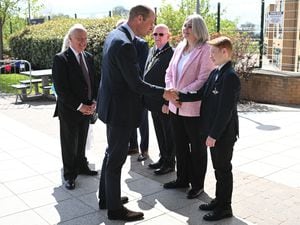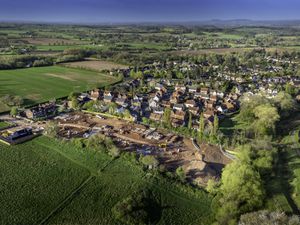Alzheimer's test brings new hope
There are many good reasons why dementia has been described as 'one of the greatest enemies of humanity'.
The Prime Minister was absolutely right to call recently for a bold and global push to tackle this most cruel of fates.
It knows no boundaries in terms of wealth, gender, country or race. And in its ability to target anyone and everyone, the scourge of dementia unites the world against a common foe.
So it is a vital leap forward that a simple blood test that could predict the onset of Alzheimer's disease before the symptoms appear could be available in two years.
Although the test will cost up to £300 each, it will be money well spent for the National Health Service to make this available to everyone free of charge.
There is little in modern social care that costs more than looking after a physically healthy but mentally challenged older person.
The blessing of contemporary science and medicine is that we all have the chance to live longer.
But that time with loved ones, enjoying the grandchildren and even great grand children, comes with an enormous risk.
Those who care for someone with dementia face the pain of watching all that makes them who they are fall away, leaving an echo of the person that raised them.
Early diagnosis does not mean a cure. But it does allow the time to prepare and make the right arrangements.
It is heartbreaking enough as it is to suffer from a disease that destroys a lifetime of memories.
But to have to go through the red tape of legal matters with someone no longer capable of deciding on their affairs for themselves only makes it worse.
To know that we can all have the chance to prepare for dementia and set out how we want to deal with it puts everyone back in control of their own destiny.
Society is judged by how it treats its elderly.
More of us today will live to be elderly than any generation before.
None of us can listen to stories of the deterioration of the mind and assume it will happen only to other people.
Trials of drugs to halt or reverse Alzheimer's have so far ended in failure.
Even so, we must live in hope that one day there will be a cure.
It may not come in time to help those we love or even ourselves.
For now, forewarned is forearmed.
We must remember them
The release of 300,000 First World War records will remind us how to remember the fallen.
Time has taken its inevitable toll on the survivors of the war and the baton has now been passed to younger generations to ensure everything they did is appreciated forever.
The Commonwealth War Graves Commission documents give an insight into how the war dead were commemorated.
They provide, in the words of an archivist, a 'window into the past' and the work that was done to remember those who lost their lives in service to their country.
They also show how much effort was gone to in order to preserve their memories.
Hand written notes, corrected in a strive for accuracy, lists of people recovered or exhumed so they could be moved to a suitable final resting place - they prove that far from the view of some historians that young men were little more than cannon fodder, all of them were missed and every effort was made to pay tribute to their enormous sacrifice.
Britain is the free country that it is today because of the people who fought in the First and Second World War.
The very least any of us can do is remember them and be thankful.





